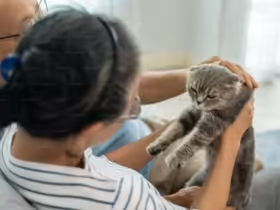Pancreatitis is a medical condition that can affect cats, often leading to significant discomfort and health issues. As a cat owner, understanding pancreatitis—its causes, symptoms, and how to care for a cat with this condition—is crucial for ensuring your feline friend receives the appropriate treatment and support. In this blog, we’ll explore what pancreatitis is, how it affects cats, and the best ways to manage and care for a cat dealing with this health issue.
What Is Pancreatitis?
Pancreatitis is the inflammation of the pancreas, an organ located near the stomach and intestines that plays a critical role in digestion and blood sugar regulation. The pancreas produces digestive enzymes and hormones such as insulin, which helps regulate blood sugar levels. When the pancreas becomes inflamed, it can lead to a range of health problems and disrupt the normal digestive process.
Types of Pancreatitis in Cats
- Acute Pancreatitis: This is a sudden onset of inflammation that can be severe and potentially life-threatening. Symptoms often appear abruptly and may require immediate medical intervention.
- Chronic Pancreatitis: This type develops over a longer period and can cause ongoing discomfort and digestive issues. Chronic pancreatitis may be less acute but can lead to persistent health problems if not managed properly.
Causes of Pancreatitis in Cats
The exact cause of pancreatitis in cats is often unclear, but several factors can contribute to the development of this condition:
- Dietary Factors: High-fat diets or sudden changes in diet can trigger pancreatitis in cats. Some cats may have sensitivities to specific ingredients.
- Obesity: Overweight cats are at a higher risk of developing pancreatitis due to the increased strain on their organs and metabolic processes.
- Infections: Bacterial or viral infections can lead to inflammation of the pancreas.
- Toxins: Exposure to certain toxins or medications can induce pancreatitis in cats.
- Trauma: Physical injury to the abdominal area can sometimes result in pancreatitis.
- Underlying Health Conditions: Conditions such as diabetes, liver disease, or gastrointestinal issues may increase the likelihood of developing pancreatitis.
Symptoms of Pancreatitis in Cats
Recognizing the symptoms of pancreatitis is vital for seeking timely veterinary care. Symptoms can vary depending on the severity of the inflammation but often include:
- Vomiting: Frequent or persistent vomiting can be a sign of pancreatitis and may be accompanied by abdominal discomfort.
- Diarrhea: Cats with pancreatitis may experience diarrhea, which can be watery or contain blood.
- Loss of Appetite: A noticeable decrease in appetite or refusal to eat can be indicative of pain or discomfort related to pancreatitis.
- Abdominal Pain: Cats may exhibit signs of abdominal pain, such as sensitivity to touch or a hunched posture.
- Lethargy: A cat suffering from pancreatitis may become unusually tired and less active.
- Dehydration: Vomiting and diarrhea can lead to dehydration, which may be evident through dry gums and decreased skin elasticity.
- Fever: An elevated body temperature may accompany inflammation and infection.
Diagnosis of Pancreatitis in Cats
If you suspect your cat has pancreatitis, it’s crucial to seek veterinary care for an accurate diagnosis. The veterinarian will typically perform the following:
- Physical Examination: A thorough examination to assess your cat’s overall condition and check for signs of abdominal pain or tenderness.
- Blood Tests: Blood work can help identify elevated levels of pancreatic enzymes (e.g., amylase, lipase) and other markers indicative of inflammation.
- Ultrasound or X-rays: Imaging techniques can be used to visualize the pancreas and assess the extent of inflammation or other abnormalities.
- Biopsy: In some cases, a biopsy may be needed to confirm the diagnosis and rule out other conditions.
Treatment of Pancreatitis in Cats
The treatment for pancreatitis aims to reduce inflammation, manage symptoms, and address the underlying causes. The specific approach will depend on the severity of the condition and your cat’s overall health.
Immediate Care
- Hospitalization: Severe cases may require hospitalization for supportive care, including intravenous fluids to combat dehydration and restore electrolyte balance.
- Medications: The vet may prescribe medications to control pain, reduce inflammation, and manage nausea and vomiting. Anti-nausea drugs, analgesics, and appetite stimulants are commonly used.
- Nutritional Support: Providing a special diet that is easily digestible and low in fat is crucial. Your vet may recommend a specific prescription diet or a bland diet that suits your cat’s needs.
Home Care
- Dietary Management: At home, you should continue to feed your cat a low-fat, easily digestible diet. Avoid giving table scraps or high-fat treats.
- Monitoring: Keep a close eye on your cat’s symptoms and behavior. Monitor for any changes in appetite, vomiting, diarrhea, or signs of pain.
- Hydration: Ensure your cat has access to fresh water at all times. Dehydration can be a concern, so encourage regular drinking.
- Follow-Up Visits: Regular follow-up visits with your vet are important to monitor your cat’s progress and adjust the treatment plan as needed.
- Medication Administration: If your cat is prescribed medications, administer them as directed by your vet. Some medications may need to be given with food or at specific intervals.
Preventing Pancreatitis
While not all cases of pancreatitis can be prevented, there are steps you can take to reduce your cat’s risk:
- Balanced Diet: Feed your cat a well-balanced diet that is appropriate for their age, weight, and health condition. Avoid sudden dietary changes and high-fat foods.
- Maintain a Healthy Weight: Regular exercise and portion control can help keep your cat at a healthy weight and reduce the risk of obesity-related pancreatitis.
- Regular Veterinary Check-Ups: Routine check-ups can help identify and manage underlying health issues that may contribute to pancreatitis.
- Avoid Toxins: Ensure that your cat does not have access to harmful substances, including certain plants, chemicals, and medications not prescribed by your vet.











Leave a Reply